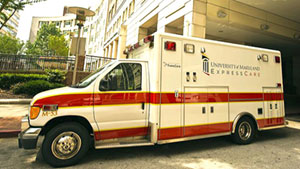The Neurocritical Care Clinical Experience
 Fellows will rotate for 7 months in the University of Maryland Medical Center's Neurocritical Care and Emergency Neurology Unit. The neurocritical care unit is a 22 bed unit split into East/West sides with two rounding teams, each with an attending and a fellow. Attendings hail from multiple disciplines including neurology, emergency medicine, neurosurgery, and anesthesiology. Fellows are responsible for leading the rounding team (pre-attending), bed triage, and staffing neurocritical care consults in other units with the neurology residents.
Fellows will rotate for 7 months in the University of Maryland Medical Center's Neurocritical Care and Emergency Neurology Unit. The neurocritical care unit is a 22 bed unit split into East/West sides with two rounding teams, each with an attending and a fellow. Attendings hail from multiple disciplines including neurology, emergency medicine, neurosurgery, and anesthesiology. Fellows are responsible for leading the rounding team (pre-attending), bed triage, and staffing neurocritical care consults in other units with the neurology residents.
The neurocritical care unit has a large volume of high-acuity patients, including approximately 80 subarachnoid hemorrhages, 200 intracerebral hemorrhages, 200 ischemic strokes, and 100 status epilepticus referrals. The rest of the caseload is a mix of post-operative neurosurgical patients, neuromuscular disease, and encephalitis/meningitis patients. While teams are admitted under either neurosurgery, stroke, or the neurocritical care team, all critical care management and all order management is done by the neurocritical care team.
Fellows will become facile in all critical care procedures, including intubations, bronchoscopy, central and arterial line placement, chest tube placement, bedside ultrasound, central veno-venous hemofiltration, and plasma exchange. They will also gain confidence in the interpretation of a variety of multimodal monitoring techniques including continuous EEG (with 24/7 in-house EEG tech coverage and a 2-week rotation), brain tissue oxygenation, jugular venous oxygenation, and microdialysis.
Fellows will rotate for three months in the neurotrauma unit. The 14 bed neurotrauma unit sees over 400 patients with moderate to severe TBI annually, as well as 150 annual cases of spinal cord injury. In this unit, fellows play the role of primary provider. The diverse faculty, all boarded in neurocritical care, trained in a variety of disciplines including neurology, neurosurgery, anesthesiology, emergency medicine and trauma surgery. Again, all order management and critical care management is done by the ICU team.
The University of Maryland is a Comprehensive Stroke Center and regional center of excellence in stroke care and research. The fellows work with an experienced and committed vascular neurology faculty as part of the Brain Attack Team (BAT), a 24/7 multi-specialty team dedicated to rapid evaluation and treatment of patients both within the university and throughout the region via telemedicine with vascular causes of neurological disorders.
Opportunities are available for interested fellows in learning to perform and interpret carotid duplex/color flow Doppler and Transcranial Doppler studies, and rotate with the neurointerventional team.
Individualized pathways are available for fellows from different training backgrounds.
Critical Care Training outside the Neurocritical Care Unit
Fellows will spend 6 months rotating outside of neurocritical care. Rotations include the surgical ICU, the medical ICU, the cardiac surgery ICU, , the critical care resuscitation unit, critical care ultrasound, and an airway rotation. Fellows will learn to perform echocardiography, as well as thoracic/abdominal (FAST)/vascular ultrasound. Fellows can take advantage of dedicated ECMO and ATLS courses in the Shock Trauma Simulation Center.
Our airway rotation is committed to helping fellows achieve competency in beginner and advanced airway techniques for independent practice. Regardless of the unit, the rotating neurocritical care fellow will serve as the primary fellow and will never function as an observer. There are 6.5 months of elective during which fellows may opt to do additional clinical rotations.
